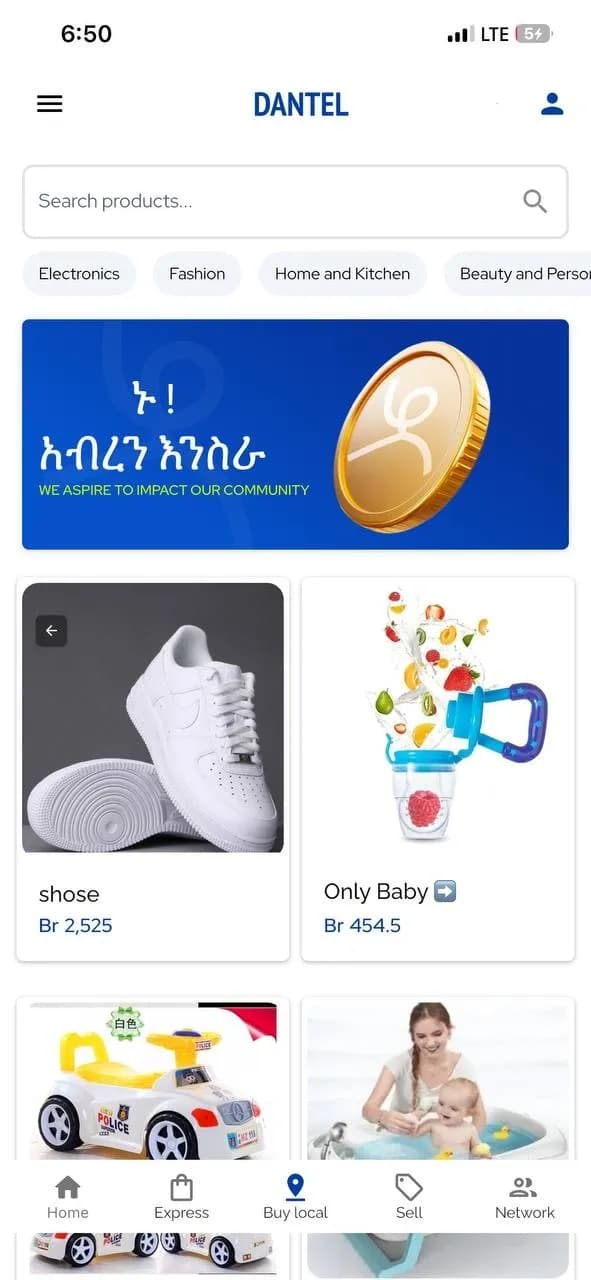Progress for 0 ad
Progress for 1 ad
Progress for 2 ad
Progress for 3 ad


Munir Shemsu
Addis Ababa, Ethiopia

When Dawit Ephrem walked through the buzzing aisles of Mercato, Ethiopia’s largest marketplace, he was struck by what made it all work: trust. In a market where goods move from hand to hand and trucks travel hundreds of kilometers across the country, transactions often rest not on formal contracts but on mutual confidence. A seller in the capital could ship an entire truckload of merchandise to a buyer in a distant town, certain that payment would follow.
That trust, Dawit realized, was a kind of invisible infrastructure, one he wanted to re-create online.
A developer known for early apps like Inspire Ethiopia, Dawit became fascinated by the idea of building a digital ecosystem that mirrored these traditional trust networks, linking traders, affiliates, and buyers. Two years ago, his vision took shape as Dantel, a socio-ecommerce platform, debuted at the Startup Ethiopia conference. It takes its name from the Amharic word for crochet, a craft known for its intricate, interwoven patterns made with a needle.
The pilot app blended affiliate marketing, social media, and community networks, offering a new spin on e-commerce. Despite enthusiasm from attendees and even interest from federal agencies, Dantel quickly ran into hurdles: tax complications, delivery issues, and logistical bottlenecks.
“We learned a lot from the pilot,” Dawit recalled to Shega.
Two years and 10 million birr in angel investment later, Dantel returned, leaner, smarter, and with a clear strategy. Now backed by a seven-member team, the platform attracts an average of 4,000 daily users and hosts hundreds of stores and affiliates. To fix logistics, Dantel partnered with Ethio-Post, Ethiopia’s national postal service, and introduced a 10% advance payment system to ensure product quality. Deliveries now arrive within 24 hours, with urgent deliveries charging extra fees, while tax compliance is being helped with regular reporting.
For Dawit, who hopes to reach 50,000 active users by year’s end, Dantel has to continue tapping into Ethiopia’s long-standing trade culture by leveraging the growth in social media adoption. He says the platform has to provide increased incentives for affiliates who cultivate a trusted social network.
“Most people here buy from someone they know,” he said. “We’re giving them a way to monetize those trust networks.”
The model allows individuals to earn commissions by sharing store links on social media, promoting or helping complete purchases. The platform takes a 10% cut from affiliate margins, while buyers pay a returnable 100-birr advance before confirming the order. Payments, processed through Chapa, can be made from nearly all banks and mobile money providers in Ethiopia.
Globally, e-commerce leveraging social networks is rapidly reshaping online shopping. In 2024, 42% of U.S. internet users made purchases directly through social media, contributing to a global market projected to reach $1.2 trillion by 2025. Fueled by influencer marketing, AI-driven personalization, and the growing demand for convenience and authenticity, these platforms turn likes, comments, and reviews into powerful purchase drivers, making social commerce one of the fastest-growing frontiers in digital retail.
Yet the path ahead remains steep for startups like Dantel. Dozens of Ethiopian e-commerce startups have struggled to scale, hampered by high taxes, weak logistics, and regulatory uncertainty. A recent survey of 80 local platforms found that nearly 60% made less than $10,000 annually. Dawit knows the risks.
Even so, his team is already expanding. An AI chatbot set to launch soon will allow users to search for products, prices, and vendors in three languages. Verified badges for trusted sellers are also on the way.
Dawit, who also serves as CTO of Hello Erf, an agritech startup connecting smallholder farmers with suppliers of mechanized tools, sees Dantel as part of a larger vision to bring Ethiopia’s age-old systems of social trust into the digital age.
“A trust-based network of networks is what we’re building,” he said.
👏
😂
❤️
😲
😠

Munir Shemsu
Munir S. Mohammed is a journalist, writer, and researcher based in Ethiopia. He has a background in Economics and his interest's span technology, education, finance, and capital markets. Munir is currently the Editor-in-Chief at Shega Media and a contributor to the Shega Insights team.
Your Email Address Will Not Be Published. Required Fields Are Marked *